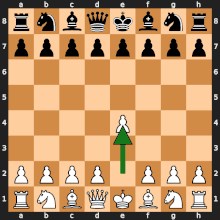
Einstein versus Oppenheimer is a game of chess said to have been played between theoretical physicists Albert Einstein and J. Robert Oppenheimer in Princeton University, United States in 1933. During the game, Einstein would have used the Ruy Lopez opening, which Oppenheimer responded with the Morphy Defense (3...a6). The victory is attributed to Einstein.[1]
There is no conclusive evidence that Albert Einstein and J. Robert Oppenheimer ever played chess together.[2]
History and factual accuracy
The earliest known source for the game is the 1959 book Freude am Schach by Gerhard Henschel,[3] but provides no date or venue.[4][5][6] The 1967 French Dictionaire des echecs,[7] cites Henschel's book but refers to the chess game in conditional tense.[4][6] Henschels book is also known for containing other unverified chess games from other famous figures like Joseph Stalin or Leo Tolstoy.[4][6]
Albert Einstein and chess
In at interview with the The New York Times in 1936 at Princeton University, Einstein responded that he had never participated in three-dimensional chess, just ordinary chess during childhood. Einstein explained that he had no time for any games.[8][9]
Einstein is also known for saying "I have to confess that I have always disliked the fierce competitive spirit embodied in that highly intellectual game" when referring to his friend and chess champion Emanuel Lasker.[10][11] Chess grandmaster Larry Evans confirmed to have met people that played chess against Einstein at Princeton University and argued
My guess is Einstein disliked the fierce 'competitive spirit' inherent in human nature rather than an innocent pastime that is a bloodless substitute for war. His game with Oppenheimer must stand until someone someone can prove it was fake".[11]
Alternative dates and players
Alternatively, 1982 Romanian book Şah Cartea de Aur by C. Ştefaniu[12] lists the game as played in 1940 in the United States.[4][6]
Einstein as in Einstein vs Oppenheimer might not refer to Albert Einstein. Dennis Holding, Adam Slemsen and Andy Soltis have independently attributed the game to Albert Einstein's son, Hans Albert to have played against Oppenheimer in either in 1940[13][4][6] or 1945[14] at the University of California, Berkeley, where Hans Albert gave lectures.[5][2] Chess historian Edward Winter has suggested the possibility that it might refer to B. Einstein a professional chess player unrelated to Albert Einstein.[4]
Match
White: Einstein Black: Oppenheimer
- 1.e4 e5 2.Nf3 Nc6 3.Bb5 a6 4.Ba4 b5 5.Bb3 Nf6 6.OO Nxe4 7.Re1 d5 8.a4 b4 9.d3 Nc5 10.Nxe5 Ne7 11.Qf3f6 12.Qh5+ g6 13.Nxg6 hxg6 14.Qxh8 Nxb3 15.cxb3 Qd6 16.Bh6 Kd7 17.Bxf8 Bb7 18.Qg7 Re8 19.Nd2 c5 20.Rad1 a5 21.Nc4 dxc4 22.dxc4 Qxd1 23.Rxd1+ Kc8 24.Bxe7 Black resigns.
References
- ↑ "Kramnik on boxing, Fischer, Kasparov and Einstein". Chess News. 8 May 2005. Retrieved 6 November 2023.
- 1 2 The British Chess Magazine. Vol. 88–89. Trubner & Company. 1968. p. 225.
- ↑ Henschel, Gerhard (1959). Freude am Schach (in German). Gütersloh: Bertelsmann.
- 1 2 3 4 5 6 Winter, Edward (2023). "Alleged Games by Einstein and Stalin". Chess History. Retrieved 28 August 2023.
- 1 2 Wall, Bill (2011). "Albert Einstein and Chess". White Knight Review. 2 (5): 7.
- 1 2 3 4 5 Winter, Edward (2007). "Edward Winter presents: Unsolved Chess Mysteries (7)". ChessBase. Retrieved 29 August 2023.
- ↑ Le Lionnais, François; Maget, Ernst (1967). Dictionnaire des échecs (in French). Paris: Presses universitaires de France.
- ↑ Wolff, Alexander (18 March 1979). "A Relatively Unknown Einstein". The New York Times.
- ↑ Smith, Robert P. (28 March 1936). "NEW CHESS THEORY NOT FOR EINSTEIN; Scientist Denies Ever Playing 'Three-Dimensional' Game, Even for Relaxation". The New York Times.
- ↑ Hannak, J. (1 January 1991). Emanuel Lasker: The Life of a Chess Master. Courier Dover Publications. p. 7. ISBN 978-0-486-26706-7.
- 1 2 Evans, Larry (January 2003). "An Einstein game (cont.)" (PDF). Chess Life: 63.
- ↑ Ştefaniu, Constantin (1982). Şah Cartea de Au. Bucharest: Sport-Turism.
- ↑ Soltis, Andy (July 1979). "Science at Play" (PDF). Chess Life: 372.
- ↑ Holding, Dennis H. (7 October 2021). The Psychology of Chess Skill. Routledge. p. 8. ISBN 978-1-000-39478-8.